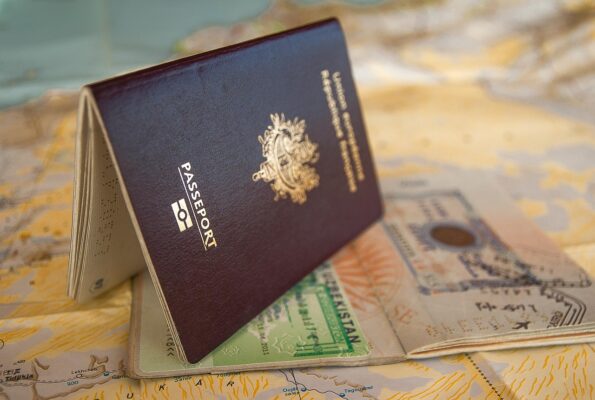If you're looking for a new place to call home, you might want to consider the opportunity to immigrate to Estonia. This small northern European nation is known for its clean environment, digital lifestyle, and strong community. Whether you are relocating for work, study, or an entirely fresh start, Estonia offers a modern yet peaceful setting, with easy access to nature.
The cost of living is reasonable (especially when compared to some of its Nordic neighbors), public services are efficient, and English is widely spoken (especially in the capital city, Tallinn, and other larger urban areas). Whether you find yourself in the historic capital, a quiet coastal town, or anywhere in between, you will be welcomed with open arms. Here, we will explore the details of moving to Estonia, covering the steps you must follow to ensure your immigration process goes without a hitch.
Estonia Entry Requirements
EU, EEA, and Swiss citizens can stay in Estonia for three months with an identity card or a valid travel document. If they intend to remain and/or work in Estonia for an extended period of time, they will need to register their residency in the Estonian population registry. However, if you're from a non-EU, EEA, or Swiss nation that doesn't have a visa-free Schengen agreement, you'll need a visa to enter Estonia. Applicants from a non-European country can apply for:
- A short-stay visa that lets you stay in the country for 90 days
- A long-stay D visa that lets you stay in the country for one year.
Visas Required for Immigration to Estonia
Here are the different types of visas you need for moving to Estonia:

1. Estonia Work Visa
Immigrating to Estonia for employment purposes is quite common among foreign nationals. Anyone outside the European Union, EEA, or Switzerland who wishes to work in Estonia must apply for a work visa. The job market here is quite competitive, but with numerous opportunities. If you intend to stay for more than a year after receiving a work visa, you must apply for an Estonian temporary residence permit card.
You can also get a permit for business purposes. To work in Estonia, the EU, EEA, and Switzerland citizens are exempted from a work visa. They are only required to apply for an ID card in the first month of their stay and register as an Estonian resident in the Population Register of Estonia. To apply for an Estonian work visa (for non-EU employees), you must meet the following requirements:
- Your employer must register your work with the Border Guard Board and the Estonian Police.
- You must have a valid employment contract.
- You must meet the qualifications for the position you are applying for.
- You must be healthy.
2. Estonia Student Visa
If you want to immigrate to Estonia to study, you’ll need an Estonian study visa. You must apply for an Estonian student visa if you are from Switzerland or a non-EU/EEA country and intend to complete your further studies in Estonia. An Estonian student visa allows you to work, study, and live in Estonia for a year. If your studies last over a year, you must apply for a temporary residence permit. Depending on how long you want to study in Estonia, you may apply for:
- Short-term visa: This Estonia visa allows you to stay in Estonia for 90 days during a six-month period. It is ideal for conferences, training, classes, etc.
- Long-term student visa: You can spend 365 days in Estonia studying with this visa.
- Temporary residence permit: With the residency permit, you have five years to stay and pursue your studies in Estonia.
3. Estonia Family Visa
A family reunification visa for Estonia is required if you are a foreign national (non-EU citizen) with close relatives in Estonia and wish to visit them. With this visa, you can spend the same time in Estonia as your family member, studying, working, and living there. Anyone who isn't from the EU, EEA, or Switzerland and wants to visit their family in Estonia must apply for a family visa. Applying for a family visa in Estonia requires you to be the:
- Partner or spouse of an Estonian resident
- Dependent child of an Estonian resident
- Parent/Grandparent or Estonian resident
- A foreign national who is over 65 and unable to care for themselves but has family members (children, close relatives) in Estonia who can look after them.
4. Estonia Digital Nomad Visa
The Estonia digital nomad visa is a special visa explicitly designed for freelancers to work in Estonia. Working abroad qualifies you for Estonia's digital nomad visa, which means:
- The company you work for is not registered in Estonia.
- You work as a freelancer for international clients.
- You have a firm registered in another country. Furthermore, you must earn a minimum of €4,500 each month. However, the actual number is subject to change.
5. Estonia Investment Visa
Applying for an Estonian Investment Visa is an option for entrepreneurs who wish to grow their companies or who have fresh concepts for innovative companies with more potential. You can also get citizenship by investment if you meet all requirements. To be eligible for an Estonian investment visa, the investor needs to fulfill the following criteria:
- The investor must be at least eighteen years old.
- The investor needs to be in good health.
- The investor must be free of criminal charges.
- For investors to make the desired investment in Estonia, they must be financially stable.
- The investor needs to be a seasoned business owner.
- The investor has to understand the Estonian market.
Documents Required for an Estonia Visa Application
Here are the documents you'll need for your immigration process:
- A valid passport
- Visa Application Form
- Two passport-size photographs
- Proof of visa fee payment
- Bank statements
- Proof of accommodation
- Invitation letter
- Health insurance
- Cover letter
- Proof of a clean criminal record
- Birth certificate
- Employment contract
- Letter of acceptance from the Estonian institution
- Medical report
How to Apply for an Estonia Visa
You must schedule an appointment at one of the following locations to apply for an Estonian visa:
- The closest embassy or consulate to your country of origin.
- If your country does not have an Estonian consulate, you can seek representation from another Schengen country consulate.
- A visa agency that provides the option to apply through it.
The steps to apply for a visa to immigrate to Estonia are as follows:
1. Schedule an Appointment with the Estonian Embassy/Consulate
You need to schedule an appointment with the Estonian embassy or consulate closest to your place of residence. Making an appointment is a crucial step in the visa application process. To avoid any delays, schedule your appointment at least two weeks before your travel date, as numerous applicants can submit visa applications every day.
2. Submit the Documents
To apply for an Estonian visa, you must present the necessary and original documents at the Estonian embassy or consulate closest to you. Official translations into Estonian language or English are required for these documents. The Estonian Authorities will notify you of all the documents pertaining to your case. Any missing documentation may result in visa refusal.
3. Attend the Visa Interview
You will pay an application fee and might be asked to engage in an interview when you turn in your documents at the Estonian embassy or consulate. Questions about your trip to Estonia, its goal, the length of your intended stay, etc., will be asked during the interview.
4. Wait for a Decision
After sending the needed documents, providing the necessary paperwork, and attending the interview, the next step is to wait for the embassy to respond with your visa results. The processing time for an Estonian visa is usually between fifteen and thirty days.
Estonia Visa Fees
If you plan to immigrate to Estonia, ensure to know about the visa payment. Applying for a Schengen visa to Estonia, whether through an Estonian representative or in Estonia itself, typically costs €80 ($90). Type D long-term visas normally cost €100 ($112); however, they are €60 ($67) for children ages 6 to 11.
Relocating as a Highly Qualified Worker to Estonia
Moving to Estonia can also be done by first obtaining employment as a highly qualified employee. To be employed as a skilled professional in Estonia, you must get an EU Blue Card. You must have completed a three-year or longer university or college program to qualify for the Blue Card.
An alternative method of proving you qualify is to provide a minimum of five years of relevant work experience. You may apply for residency in Estonia if you have been a resident of the EU for the last two years and have an EU Blue Card after five years of temporary residence in the EU. To do this, apply to the Police and Border Guard services two months before the expiration of your Blue Card.
Estonian Citizenship
Estonia is a popular choice among foreign nationals because of its low crime rate and good quality of life. Some foreigners move to Estonia to stay there permanently. A foreign national can obtain citizenship by naturalization or at birth if they have been a lawful resident of the nation for at least eight years before applying, five of which were as a permanent resident. A foreign individual who wants to immigrate to Estonia and become an Estonian citizen must meet specific requirements, including being enrolled in the population register, having proof of language competency, and having permanent legal income.
Conclusion
Estonia offers a safe, modern, and welcoming environment for those seeking a fresh start. If you're ready to immigrate to Estonia, you'll find a country that values innovation, nature, and community. With the right preparation, moving here can be a smooth and rewarding experience for individuals and families.
















